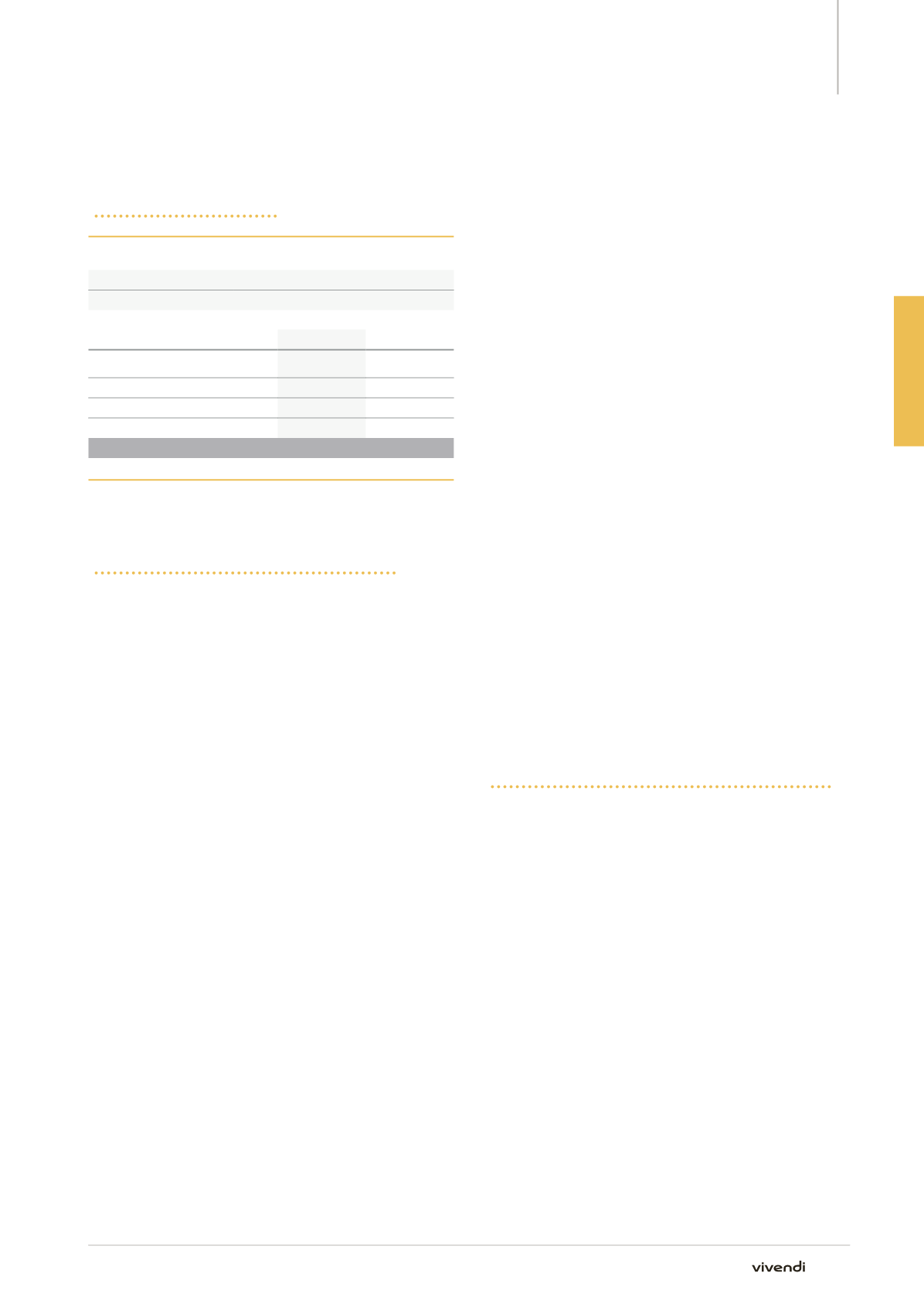

2
Societal,
Social
and Environmental Information
Social Indicators
■
■
3.2.6.2.
Employment and Integration
of Disabled Workers
Workers with Disabilities in France
Workers with Disabilities
GRI
UNGC
OECD
G4-LA12
1, 6
IV, V.1.e
2014
2013
C+G
90
72
UMG
10
9
Vivendi Village
5
4
Headquarters
-
-
Total
105
85
In 2014, the number of workers with disabilities rose by 24% in Vivendi’s
business units in France. This increase was due to the commitments
made by the Canal+ Group under its agreement.
Employment and Integration of Workers with Disabilities
The definition of a “worker with disabilities” used in this indicator is
the one defined by national legislation or, failing this, by Convention
159 of the International Labor Organization (ILO): “any individual whose
prospects of securing, retaining and advancing in suitable employment
are substantially reduced as a result of a duly recognized physical,
sensory, intellectual or mental impairment”.
p
p
As part of its corporate social responsibility, the Canal+ Group has
been committed to a sustainable policy of hiring employees with
disabilities for several years. By implementing a series of agreements
on the hiring of employees with disabilities and with an awareness
policy on this topic under the CanalHandi+ banner, co-workers are
reminded of the group’s commitments in this area to recruit, integrate
and retain disabled workers in jobs, as well as its participation in
training disabled youth through internships or work/study programs.
The disability agreement currently in force was signed for a three-
year period (from 2013 to 2015) by all the trade unions represented in
the group, thus enhancing the commitments already made in previous
years, such as:
–– hiring 20 workers with a disability between 2013 and 2015, and a
“discovery” policy for identifying young graduates with a disability
through internships and work/study programs;
–– participating in recruitment forums and maintaining specific
partnerships such as
Handicafé
,
Forum Adapt
,
Osons!
and
Tremplin
;
–– increasing business with the sheltered sector through increased
communication starting from the Purchasing department and
involving all employees;
–– assisting a significant number of employees to report their
disability, with the help of a social worker for administrative
support;
–– empowering disabled employees and keeping them on the payroll
through various forms of assistance that have been reassessed:
•
authorized absences compensated (as part of procedures for
recognition of disabled worker status, for medical care or a
sick disabled child),
•
disability Universal Employment Service Checks (
Chèques
Emploi Service Universel
– CESU) mainly funded by the
company,
•
participation in funding assistance associated with disabled
workers within the company;
–– numerous communication initiatives carried out, in particular
during National Disabled Employment Week. In 2014, programs
were held to raise awareness of disability, featuring several topics
such as “invisible” disabilities;
–– information and awareness campaigns on the Intranet, and a
disability referral agent network created among employees;
–– disability awareness and training sessions held for employees and
managers; and
–– HR staff and managers trained in hiring disabled workers.
p
p
UMG: in Germany a “Disabled Employee Officer” is in charge of
handling the needs of disabled workers.
p
p
Digitick works closely with the association
Accompagner la
Réalisation des Projets d’Études de Jeunes Élèves et Étudiants
Handicapés
(ARPEJEH) as concrete evidence of its commitment to an
active policy promoting the employment of disabled young people, of
equal opportunity, and diversity.
The integration of people with disabilities and non-discrimination
are principles respected within every company in the group. In the
recruitment process, the companies ensure equal treatment for
applications and maintain strict respect for the individual. At the same
time, the companies have developed specific training programs for
employees and managers in order to raise awareness of disabilities.
■
■
3.2.6.3.
Promoting Diversity
and Non-Discrimination Policies
Diversity and Non-Discrimination Policies in the Business Units
In accordance with Vivendi’s Compliance Program, the group’s
subsidiaries are committed to equal opportunities for all in recruitment,
mobility, promotion, training and compensation, without distinction as to
gender, religion, origin, age, personal life or disability.
Vivendi’s Compliance Program states that, in each subsidiary, the
Compliance Officer is in charge of responding to the concerns of
employees. Moreover, in the US and the UK subsidiaries, a hotline is
available to employees, in accordance with prevailing regulations, to flag
any cases of discrimination or harassment.
The Vivendi group is aware of the issue of diversity and pursues a policy
in favor of equal opportunities, as defined in various ways depending on
the subsidiary:
p
p
providing employee training on diversity issues;
p
p
implementing agreements on employing disabled workers;
p
p
negotiating and signing agreements on remote working;
75
Annual Report 2014



















